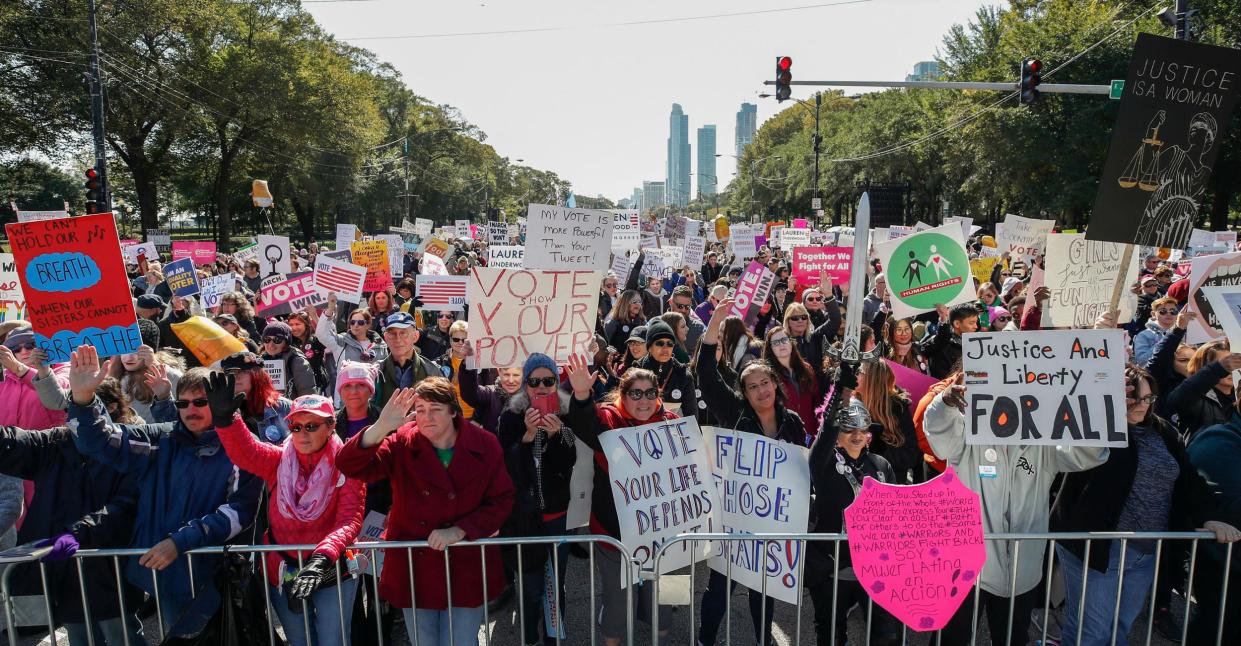Midterm elections: Voter enthusiasm soars among young people, Democrats and minorities, says new poll

Voter enthusiasm is soaring ahead of the midterm elections – especially among young people, minorities and Democrats, a new poll suggests.
Turnout during midterms is typically considerably less than during a presidential election year. In 2014, just 37 per cent of people voted – the lowest percentage since World War II – while 61 per cent cast ballots in 2016.
But amid an increasingly tense political environment, and with issues such as the confirmation of Supreme Court justice Brett Kavanaugh stoking passions, 2018 is shaping up to see a large number of people come out to vote, even though Donald Trump’s name is not on the ballot.
A poll for Washington Post-ABC News found voter enthusiasm was up among all groups, but that the increase from 2014 was greatest among the young, people of colour and Democrats.
“Four years ago, midterm voter turnout fell to its lowest level in more than half a century. Republicans were able to capitalise by expanding their house majority and taking control of the senate,” the Post reported.
“Today, with that Republican house majority at risk and some close Senate races that will determine who has control of that chamber in January, a 77 per cent majority of registered voters say they are certain to vote next month or have already voted, up from a 65 per cent majority in polls in October 2014.”
Voter enthusiasm does not always translate to voter participation. As pointed out, 2014 saw barely a third of people vote, even though polls found two-thirds saying they intended to.
But a number of issues, among them the low approval rating of Mr Trump, are persuading people they need to ensure they cast their ballot in 2018.
The poll found that certainty to vote had increased by 32 points among women younger than 40, compared with 2014. Among men and women ages 18 to 29, it had risen 17 points.
Among non-white registered voters, 72 per cent were now certain to vote, up from 48 per cent in 2014 the newspaper said. White men without college degrees represented the one heavily Republican group whose certainty to vote was lower than average and had increased less than other groups.
Among voters who intended to opt for Democratic candidates for the house, 81 per cent said they were certain to vote, up from 60 per cent in 2014. Among Republican supporters, the figure was 76 per cent, compared to 73 per cent in 2014.
Most analysts believe the Democrats will flip the 23 seats they need to take control of the house, the lower chamber of congress where most legislation starts life and where any effort to impeach Mr Trump would begin. The party’s chances of taking control of the senate as well, are considerably slimmer.
Yet while Democrats will be pleased by this most recent poll, nothing is certain. Indeed, another poll, published earlier this month, found that Republicans had almost closed the enthusiasm gap with Democrats. The NPR/PBS NewsHour/Marist poll suggested Democrats now led Republicans by just 82-80 among those intending to vote, the gap having closed ten points since the summer.
Analysts said while many Democrats were fired up to vote and see the election as a referendum on Mr Trump, whose approval rating stands at 43 according to the Post poll, the president and Republican leaders have been able to use other issues to stir up their base.
The deliberate decision to paint Mr Kavanaugh as a victim of Democratic senators, and Mr Trump’s mocking of Christine Blasey Ford – one of the women to have levelled accusations of sexual assault at Mr Kavanaugh, allegations he denied – appeared to have struck a chord.
Mr Trump knows that among sections of his supporters, especially Christian evangelicals and social conservatives, there was no greater policy priority that appointing a conservative justice, especially one who appeared open to rolling back landmark rulings such as Roe v Wade, which have guaranteed women access to legal abortion.
On the day the senate voted to move forward with a ballot to confirm Mr Kavanaugh, Mary Katharine Ham, a writer a The Federalist, a conservative news magazine, appeared on CNN. “I think we are under-under-estimating the extent to which Republicans are energised by this,” she said. “You are starting to see it in things like the increase in donations to the [National Republican Congressional Committee.]
Lee Miringoff, director of the Marist Institute for Public Opinion, said: “The result of hearings, at least in the short run, is the Republican base was awakened.”

